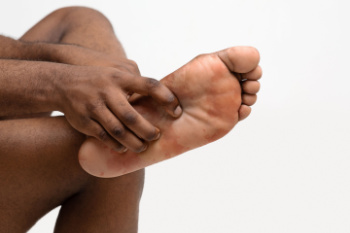Connect With Us
Blog
Symptoms and Risk Factors of Plantar Fasciitis

Plantar fasciitis is caused by inflammation of the plantar fascia, a ligament that runs from the heel to the ball of the foot, supporting the arch. The main symptoms of plantar fasciitis is sharp pain in the heel or arch that is often more severe in the morning or after prolonged standing. Heel pain may improve slightly after walking but often returns with continued activity. Risk factors for plantar fasciitis include flat feet, high arches, obesity, and repetitive activities like running. Tight calf muscles can also increase the likelihood of developing this condition. A podiatrist can evaluate your symptoms and recommend treatment options. Included are stretching exercises, footwear adjustments, and custom orthotics. Surgery may be suggested in more severe cases. If you have heel pain caused by plantar fasciitis, it is suggested that you schedule an appointment with a podiatrist for an exam and treatment.
Plantar fasciitis is a common foot condition that is often caused by a strain injury. If you are experiencing heel pain or symptoms of plantar fasciitis, contact one of our podiatrists from Illinois . Our doctors can provide the care you need to keep you pain-free and on your feet.
What Is Plantar Fasciitis?
Plantar fasciitis is one of the most common causes of heel pain. The plantar fascia is a ligament that connects your heel to the front of your foot. When this ligament becomes inflamed, plantar fasciitis is the result. If you have plantar fasciitis you will have a stabbing pain that usually occurs with your first steps in the morning. As the day progresses and you walk around more, this pain will start to disappear, but it will return after long periods of standing or sitting.
What Causes Plantar Fasciitis?
- Excessive running
- Having high arches in your feet
- Other foot issues such as flat feet
- Pregnancy (due to the sudden weight gain)
- Being on your feet very often
There are some risk factors that may make you more likely to develop plantar fasciitis compared to others. The condition most commonly affects adults between the ages of 40 and 60. It also tends to affect people who are obese because the extra pounds result in extra stress being placed on the plantar fascia.
Prevention
- Take good care of your feet – Wear shoes that have good arch support and heel cushioning.
- Maintain a healthy weight
- If you are a runner, alternate running with other sports that won’t cause heel pain
There are a variety of treatment options available for plantar fasciitis along with the pain that accompanies it. Additionally, physical therapy is a very important component in the treatment process. It is important that you meet with your podiatrist to determine which treatment option is best for you.
If you have any questions, please feel free to contact our offices located in Wheeling and Berwyn, IL . We offer the newest diagnostic and treatment technologies for all your foot care needs.
